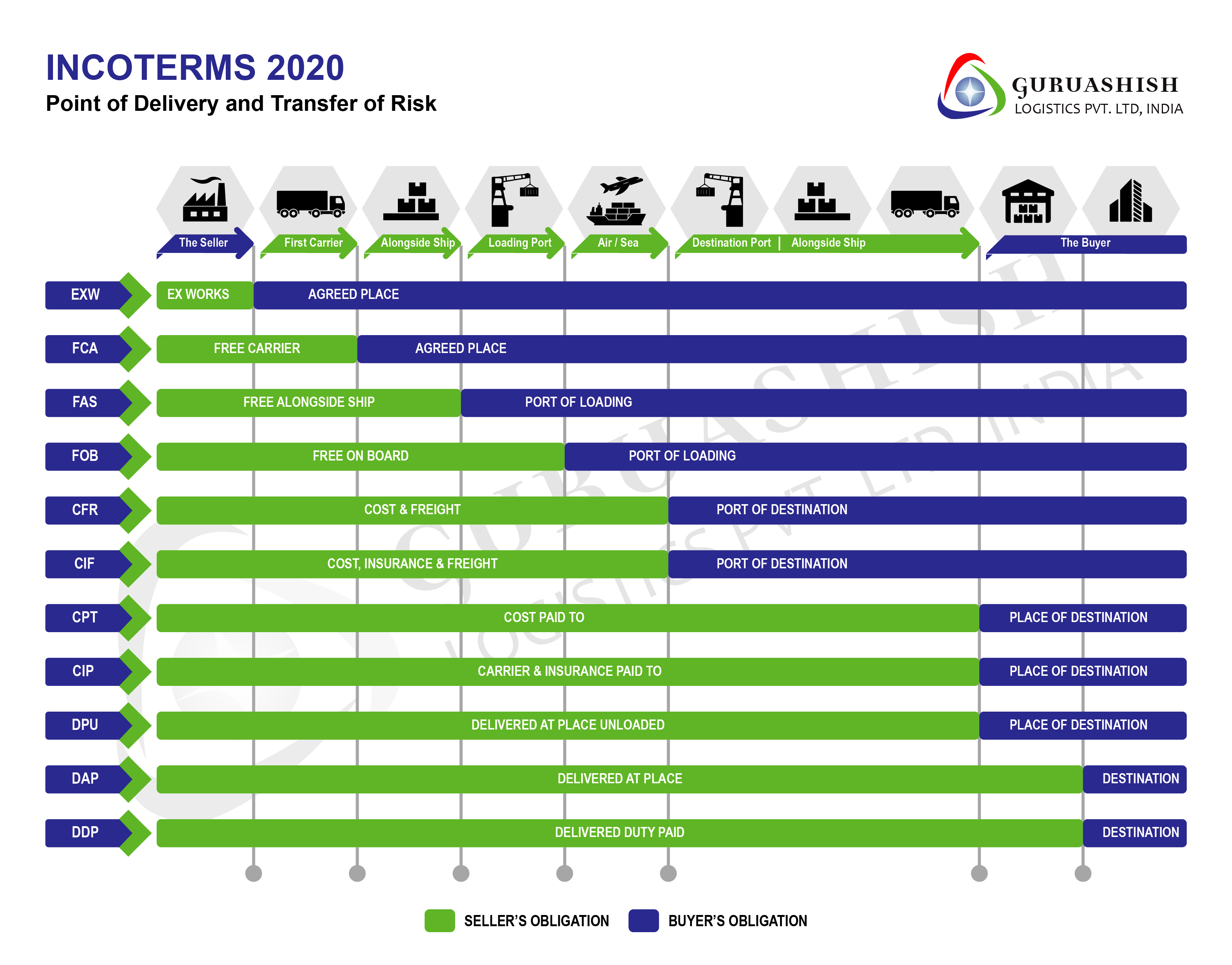
What are Incoterms?
INCOTERMS are a set of three-letter standard trade terms most commonly used in international contracts for the sale of goods. It is essential that you are aware of your terms of trade prior to shipment.
EXW (EX Works)
EXW incoterms places most responsibility with the buyer. The seller is expected to have the goods ready for collection at the agreed place of delivery (commonly the seller’s factory, mill, plant or warehouse). The buyer is accountable for all subsequent costs and risk, including all export procedures, starting with loading the goods onto a transport vehicle at the seller’s premises.
FCA (Free Carrier)
Under the FCA Incoterms terms, the seller is responsible for export clearance and delivery of goods to the carrier at the named place of delivery. Unless otherwise agreed upon by the parties, the seller is only responsible for loading the goods if the seller’s place of business is the named place of delivery. Buyer must clearly specify the precise point of delivery in the contract of sales or carriage.
FAS (Free Alongside Ship)
Under the FAS incoterm, the seller clears goods for export and places them alongside the vessel at the named port of departure. The named port of departure location can be a loading dock or a barge, but not a container terminal. The buyer is responsible for loading the freight onto the vessel, handling local carriage, discharge, import formalities and duties and onward carriage to the final destination
FOB (Free on Board)
Under the FOB incoterms, the seller clears the goods for export and ensures they are delivered to and loaded onto the vessel for transport at the named port of departure. The buyer takes over risk and costs, including import clearance and duties, as soon as the goods are loaded onto the transport vessel at the port of departure. FOB only applies to ocean or inland waterway transport.
CFR (Cost & Freight)
Under CFR terms, the seller is required to clear the goods for export, deliver them onboard the ship at the port of departure, and pay for transport of the goods to the named port of destination. The risk passes from seller to buyer after seller delivers the goods onboard the ship. The buyer is responsible for paying all additional transport costs from the port of destination, including import clearance etc. CFR applies to ocean or inland waterway transport
CIF (Cost Insurance & Freight)
Under CIF incoterms, the seller delivers the goods, cleared for export, onboard the vessel at the port of shipment, pays for the transport of the goods to the port of destination, and also obtains and pays for minimum insurance coverage on the goods through their journey to the named port of destination. The buyer assumes all risk once the goods are on board the vessel for the main carriage. CIF applies to ocean or inland waterway transport only.
CPT (Carriage Paid To)
Under CPT incoterms, the seller requires to clear the goods and arrange carriage to the named place of destination. The seller does not need to obtain or pay for insurance. A carrier is any person or company who undertakes the carriage of the goods, such as a shipping line, airline, trucking company etc.
CIP (Carriage & Insurance Paid)
Under the CIP incoterms, the seller assumes all risk until the goods are delivered to the first carrier at the place of shipment—not the place of destination. Once the goods are delivered to the first carrier, the buyer is responsible for all risks. The seller is responsible for the cost of carriage as well as all-risk insurance coverage until the freight reaches the destination.
DAT (Delivered at Terminal)
Under DAT incoterms, seller delivering the goods, once unloaded from the arriving means of transport. Goods are placed at the disposal of the buyer at the named terminal, at the named port or place of destination. DAT is used irrespective of the mode of transport selected and may also be used where more than one mode of transport is utilized.
DAP (Delivered at Place)
Under the DAP Incoterms, the seller is responsible for delivery of the goods, ready for unloading, at the named place of destination. The seller assumes all risks involved up to unloading. Unloading is at the buyer’s risk and cost. The buyer and seller should specify and agree upon the precise unloading spot at the named place of destination
DDP (Delivered Duty Paid)
Under DDP Incoterm, the seller assumes all responsibilities and costs for delivering the goods to the named place of destination. The seller must pay both export and import formalities, fees, duties and taxes. The seller is not obligated to insure the goods for pre-carriage or main carriage. The buyer is free of any risk or cost until the goods are unloaded at the named final destination, usually the buyer’s place of business.
